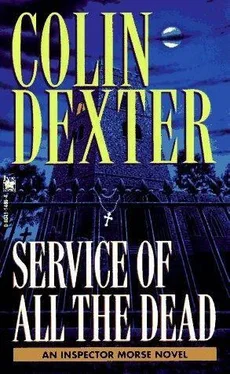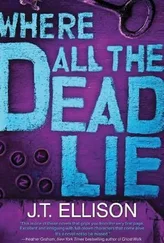Colin Dexter - Service of all the dead
Здесь есть возможность читать онлайн «Colin Dexter - Service of all the dead» весь текст электронной книги совершенно бесплатно (целиком полную версию без сокращений). В некоторых случаях можно слушать аудио, скачать через торрент в формате fb2 и присутствует краткое содержание. Жанр: Триллер, на английском языке. Описание произведения, (предисловие) а так же отзывы посетителей доступны на портале библиотеки ЛибКат.
- Название:Service of all the dead
- Автор:
- Жанр:
- Год:неизвестен
- ISBN:нет данных
- Рейтинг книги:3 / 5. Голосов: 1
-
Избранное:Добавить в избранное
- Отзывы:
-
Ваша оценка:
- 60
- 1
- 2
- 3
- 4
- 5
Service of all the dead: краткое содержание, описание и аннотация
Предлагаем к чтению аннотацию, описание, краткое содержание или предисловие (зависит от того, что написал сам автор книги «Service of all the dead»). Если вы не нашли необходимую информацию о книге — напишите в комментариях, мы постараемся отыскать её.
Service of all the dead — читать онлайн бесплатно полную книгу (весь текст) целиком
Ниже представлен текст книги, разбитый по страницам. Система сохранения места последней прочитанной страницы, позволяет с удобством читать онлайн бесплатно книгу «Service of all the dead», без необходимости каждый раз заново искать на чём Вы остановились. Поставьте закладку, и сможете в любой момент перейти на страницу, на которой закончили чтение.
Интервал:
Закладка:
'Any more contributions?'
It was the third boy who took up the easy theme. 'He always wore a suit, you see, sir, and most of the staff – well' (more sniggering) 'well, you know, most of 'em have beards, the men, I mean' (a great guffaw from the class now) 'and wear jeans and sweaters and all that. But Mr Morris, he always wore a suit and looked – well, smart, like.'
'What sort of suits did he wear?'
'Well' (it was the same boy) 'sort of dark, you know. Party suits, sort of thing. So, well, we called him "Dapper" – like we said.'
The bell rang for the end of the lesson, and several members of the class began to gather their books and file-cases together.
'What about his ties?' persisted Morse. But the psychological moment had passed, and the colour of Morris' ties seemed to have faded from the collective memory.
As he walked up the drive to his car, Morse wondered if he ought to talk to some of the staff; but he hadn't quite enough to go on yet, and decided it would be better to wait for the pathologist's report.
He had just started the engine when a young girl appeared at the driving-window. 'Hello, beautiful,' he said. It was the girl from the back row, the girl with the radar eyes, who leaned forward and spoke. 'You know you were asking about ties? Well, I remember one tie, sir. He often wore it. It was a light-blue tie. It sort of went with the suits he used to wear.'
Morse nodded understandingly. 'That's most helpful. Thank you very much for telling me.' He looked up at her and suddenly realised how tall she was. Strange how all of them looked about the same size when they were sitting down, as if height were determined not so much from the bottom to the shoulder as by the length of the legs – in this case by the length of some very beautiful legs.
'Did you know Mr Morris well?'
'Not really, no.'
'What's your name?'
'Carole – Carole Jones.'
'Well, thank you, Carole. And good luck.'
Carole walked thoughtfully back to the front entrance and made her way to the next lesson. She wondered why she so often felt so attracted to the older men. Men like this inspector fellow; men like Mr Morris… Her mind went back to the time they'd sat in the car together; when his hand had lightly touched her breasts, and when her own left hand had gently pushed its way between the buttons of his white shirt – beneath the light-blue tie he'd worn that day; the time when he'd asked her to his house, when he'd answered the door and told her that an unexpected visitor had just arrived and that he'd get in touch with her again – very soon. But he never had.
Chapter Eighteen
Morse was still asleep the next morning when his bedside phone rang. It was Superintendent Strange of the Thames Valley Police H.Q.
'I've just had a call from the City Police, Morse. You still in bed?'
'No, no,' said Morse. 'Decorating the lavatory, sir.'
'I thought you were on holiday.'
'A man's got to use his leisure hours profitably- '
'Like clambering over church roofs at the dead of night, you mean.'
'You heard?'
'Heard something else, too, Morse. Bell 's got flu. And since you seem to have taken over the case already I just wondered whether you'd like to sort of – take over the case. Officially, I mean.'
Morse shot upright in bed. 'That's good news, sir. When-?'
'From now. It'll be better if you work from St Aldates. All the stuff's there, and you can work from Bell 's office.'
'Can I have Lewis?'
'I thought you'd already got him.'
Morse's face beamed with pleasure. 'Thank you, sir. I'll just slip a few clothes on and- '
'Decorating in your pyjamas, Morse?'
'No. You know me, sir. Up with the lark- '
'And to bed with the Wren. Yes, I know. And it wouldn't be a bad thing for morale here if you got to the bottom of things, would it? So what about getting out of bed?'
Five minutes later Morse got through to Lewis and reported the good news. 'What are you doing today, old friend?'
'My day off, sir. I'm going to take the wife over to- '
'Were you?' The change of tense was not lost on Lewis, and he listened cheerfully to his instructions. He'd been dreading another visit to his ancient mother-in-law.
The Jaguar took only one and a half hours to cover the eighty-odd miles to Stamford in Lincolnshire, where the Lawson clan had lived for several generations. The speedometer had several times exceeded 85 m.p.h. as they drove along, up through Brackley, Silserstone and Towcester, then by-passing Northampton and twisting through Kettering before looking down from the top of Easton Hill on to the town of Stamford, its grey stone buildings matching the spires and towers of its many old churches. En route Morse had cheerfully sketched in the background of the St Frideswide's murders; but the sky had grown overcast and leaden, and the sight of thousands of dead elm-trees along the Northamptonshire roads seemed a sombre reminder of reality.
'They say those trees commit suicide,' Lewis, had ventured at one point. 'They secrete a sort of fluid to try to- '
'It's not always easy to tell suicide from murder,' muttered Morse.
By late afternoon the two men had uncovered a fairly solid body of information about the late and (it seemed) little-lamented Lionel Lawson. There had been two Lawson brothers. Lionel Peter and Philip Edward, the latter some eighteen months the younger Both had won scholarships to a public school some ten miles distant, and both had been weekly boarders, spending their Saturday evenings and Sundays during term-time with their parents, who ran a small local business specialising in the restoration of ancient buildings. Academically (it appeared) the two boys were more than competent, with Philip potentially the abler – if also the lazier and less ambitious. After leaving school each of them had spent eighteen months on National Service; and it was during his time in the Army that Lionel, always the more serious-minded of the two, had met a particularly persuasive psalm-singing padre, and been led to the conviction that he was called to the ministry. After demobilisation, he had studied hard on his own for a year before gaining acceptance at Cambridge to read theology. During this period Philip had worked for his father for a few years, but seemingly with little enthusiasm; and finally he had drifted away from home, occasionally revisiting his parents, but with no firm purpose in life, no job, and with little prospect of discovering either. Five years ago Mr Lawson senior and his wife had been killed in the Zagreb air-crash whilst returning from a holiday in southern Yugoslavia, and the family business had been sold, with each of the two sons inheriting about £50,000 net from the estate.
For most of the day Morse and Lewis had worked separately, each pursuing a different line of enquiry; and it was only on the last visit, to the ex-headmaster of the Lawson boys' public school, that they came together again.
Doctor Meyer's speech was that of an old schoolmaster, deliberate, over-latinised, with an apparent dread of imprecision. 'He was a clever boy, young Philip. With a modicum of dedication and perseverance – who knows?'
'You've no idea where he is now?'
The old man shook his head. 'But Lionel, now. He worked like a Trojan – although exactly why the Trojans are proverbially accredited with a reputation for industriousness has always been a mystery to me. His ambition was always to win a scholarship to Oxford, but- ' He broke off suddenly as if his memory could take him no farther along that avenue of recollection. But Morse was clearly anxious to push him past a few more trees.
'How long was Lionel in the sixth form?'
'Three years, as I recall it. Yes, that's right. He took his Higher School Certificate at the end of his second year, and got it all right. He took the Oxford entrance examination just after that, in the Michaelmas term, but I had little real hope for him. His mind was not quite – not quite alpha potential. They wrote to me about him, of course. They said they were unable to offer him a place, but the boy's work had not been without merit. They advised him to stay on for a further year in the sixth and then to try again.'
Читать дальшеИнтервал:
Закладка:
Похожие книги на «Service of all the dead»
Представляем Вашему вниманию похожие книги на «Service of all the dead» списком для выбора. Мы отобрали схожую по названию и смыслу литературу в надежде предоставить читателям больше вариантов отыскать новые, интересные, ещё непрочитанные произведения.
Обсуждение, отзывы о книге «Service of all the dead» и просто собственные мнения читателей. Оставьте ваши комментарии, напишите, что Вы думаете о произведении, его смысле или главных героях. Укажите что конкретно понравилось, а что нет, и почему Вы так считаете.












